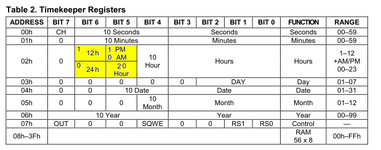denny9167
Junior Member level 2
Don't know if its been asked, but the question is does bit 5 in the hour register toggle automatically when bit 6 is set and the chip is in 12 hour mode the datasheet doesn't say for sure, I have working code, and the clock is working in 12 hour mode, but the AM/PM isnt toggling every 12 hours like it should, and the "am_pm" variable is set to read bit 5. So could I have a faulty chip?
BTW it is one of those cheap modules!
BTW it is one of those cheap modules!
